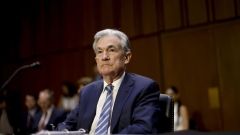Feb 7, 2022
Canada's trucker protest may spread from Ottawa to U.S.
, Bloomberg News
MPs to resume parliamentary sitting as protest of COVID-19 measures frays nerves
The nationwide truckers’ protest in Canada, known as the “Freedom Convoy” and centered in Ottawa, reflects so many global trends that it’s hard to say what it means. But the movement may well end up as the most consequential story of the year.
Under one plausible reading, many Canadians are exhausted by their government’s pandemic restrictions. The protests started in January, when laws took effect requiring truckers who crossed the border to be vaccinated. Since then, the protests have grown to reflect a broader Canadian opposition to COVID restrictions. The Canadian economy, unlike the U.S. economy, saw a big job loss in January, in part because Canada has been more reluctant to liberalize.
This reluctance is puzzling, because it is now safe to lift most COVID restrictions, in the U.S. as well as Canada. In that regard, the Freedom Convoy genuinely stands for some important freedoms. Travel, for example — either domestic or international — is not easy. If you are Canadian and do not wish to be vaccinated against COVID, it can be difficult to lead a normal life.
That is not to say that all their grievances are justified. I am generally skeptical about government mandates, but I am also very pro-vaccine. At this point in the pandemic, for the vast majority of people, getting vaccinated is far and away the best option.
The protests also have a darker side. The protesters have established a serious infrastructure of their own in Ottawa, replete with cranes and tent cities, and control much of the center city. The situation “is absolutely catastrophic both for the rule of law and for the long-term security of Canada,” tweets Canadian journalist Matt Gurney. “Everyone sees this. This is a massive failure of the state.”
So much of Canadian identity is wrapped up in being “nice” that it may be hard for Canadians and their leaders to fathom that they could lose control of their capital city. As Gurney says, it is simply assumed that Canada is “rich, stable and peaceful,” a more polite counterpart to its southern neighbor. But Canadians may be in for a rude awakening about how easy it is for the government to temporarily lose control: “I think the danger of a large violent incident in Ottawa is growing fast.”
Obviously the Canadian police and armed forces have far greater power than the truckers. But when it comes to imaginative fervor, the truckers have the advantage, just as did the forces that stormed the U.S. Capitol on Jan. 6. Who would have thought such a thing could have happened?
At least some parts of the protests reflect White supremacist and extremist ideas. Confederate flags and swastikas have been spotted, though on Twitter there is vociferous disagreement about how representative these signs are.
The debate is not merely over symbols. Using GoFundMe, donors sent CUS$10 million (US$7.8 million) to support the efforts of the truckers. GoFundMe decided not to pass those funds along, claiming the Freedom Convoy had violated its terms of service and promising refunds. Should financial infrastructure companies such as GoFundMe be making such political decisions? While a private company has a legal right to do this, such decisions could end up as de facto restrictions on political speech.
This is all happening in a country that is already chipping away at free speech. Under the guise of regulating “hate speech,” Canadian Prime Minister Justin Trudeau proposed new restrictions on internet speech last year. Of course such restrictions would have a chilling effect. So maybe the Freedom Convoy is part of a backlash to the underlying trend of restricted discourse. One way or another, freedom of speech will be asserted.
So far at least, the Freedom Convoy has yet to attract sustained and widespread coverage in the U.S. mainstream media. Maybe Americans just aren’t used to Ottawa being the epicenter of political conflict. But now that it is, we should probably be prepared for other surprises as well.



